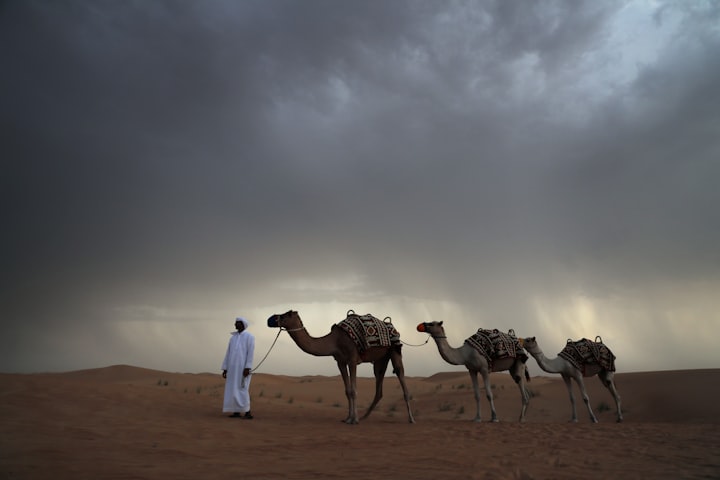The Superstitions
Part II for the multi-part story "The Desert's Edge"

Mohammedanism is the national religion of Tunisia, but it is not always realised that there are many sects, each basing its belief on the teaching of different religious leaders during the first centuries after the death of the Prophet. The divergences arose in the first instance from varying interpretations of the words of the Koran, and doubtless these divergences have crystallised since into very marked tenets. There are, I believe, more than eighty religious “orders” in the Moslem world, but the word does not bear the same signification as it does in European countries. The follower of an order belongs to an association which does not interfere with his family life or with his profession. At the head of each denomination is a “sheik” who takes up his dwelling, as a rule, near the tomb of its founder.
The sect of the Aïssaouia is remarkable for its extraordinary religious dances. It was founded by Si Mohamed ben Aïssa who died in 1524 at Meknès. Its disciples claim a complete immunity from the effect of poison. According to the legend, its founder was exiled by the Sultan of Morocco on account of his popularity with the people. Crossing the desert his followers suffered greatly from hunger, whereupon their leader told them they might safely eat scorpions, snakes, stones and thorns. This the votaries of his religion still do during their celebrations, endeavouring to prove that the faithful can at will suspend his bodily sensations through fasting and prayer.
Their services are usually held once a week, and I went to one at Kairouan in the Mosque of the Three Doors. It began at 5 p.m. The worshippers squatted in two rows on a square of matting facing each other and reciting prayers. One man after another called out the phrase in a high nasal voice, and the rest made a response in chorus. They kept swaying backwards and forwards and getting more excited. Sometimes the recitation was followed by a low abrupt sound from the rest, that sounded like the growl of a tiger. Meanwhile a boy handed round a cup of water at intervals to the worshippers, and afterwards brought in a brazier of hot coals at which he busied himself warming the parchment of the native drums.
It was fast getting dusk. In a corner sat a group of European spectators, and behind them was a pierced door through which came the fanatical ull-ul-la of women devotees. It was a weird scene. The floor of the mosque was paved with narrow bricks set edgeways, with here and there a slab of mosaic. Stone pillars lost themselves in the gloom of the roof, from which hung common kerosene lamps, strings of ostrich eggs and the coloured glass balls beloved of natives. Shadows gathered in the dim corners, and through the open doorway one could catch a glimpse of the evening sky; whilst interminably the rows of squatting figures swayed backwards and forwards and the chant grew more and more insistent. After what seemed hours, they rose to their feet, and the thudding of tom-toms began. The worshippers ranged themselves standing in a row, and a wretched unhealthy looking creature in a ragged brown burnous was brought forward. Louder and louder came the throb of the music, faster and faster the figures intoned and swayed. It seemed a whirlpool of sound, with that sinister group of devotees at the centre of it.
There was a sudden piercing wail from the women behind the door which seemed to cleave through the clotted sound of the drums and chant like the flash of a poignard. The grey light from the door fell on the ghastly face of the ragged youth. Twitches ran over his body and he staggered out from the rest. His head was thrust forward, and he held his arms stiffly behind him, jerking himself convulsively to the rhythm of the chants. He seemed to be half-hypnotised. His sickly face shone livid in the dim light, his eye-balls were turned up, and he moved in a series of jerks, staggering from side to side. And still the chanting and the music went on, barbaric and horrible, till the tension of one’s nerves became almost unbearable. The chief priest shouted something in a strident voice, and seizing the wretched creature by the shoulder he guided him round the mosque holding an object that dangled between the fingers of the other hand. As the group neared us, I saw it was a live scorpion about two inches long.
Meanwhile the boy was staggering and nearly falling and seemed to have little or no power over his limbs. It was horrible to watch, but I could not turn my eyes away. Suddenly the priest pressed the victim’s head back and dropped the wriggling insect into his open mouth. As far as I could see, the wretched creature devoured it ecstatically; I marked the movements of his throat as he swallowed. This was repeated twice. After that he was given large pieces of jagged glass, and these too he seemed to swallow. I cannot describe how horrible the whole thing was: the gloomy interior, the fanatical howling of the worshippers, and the dazed half-mad youth in the midst. He had been clinging to his guide, staggering from side to side. Suddenly he fell unconscious on the ground, and lay there groaning.
Meanwhile the ceremony went on, paying no more attention to him. Now first one and then another of the worshippers began to jerk backwards and forwards and to pull off their outer garments. One kept flinging his head from side to side, whilst his long black hair flapped first this way and then that. Long metal spikes about four feet in length were brought and the fanatics drove them into their throats or seemed to do so. In any case they drove them in so far that they held without support. They were led round, the ‘swords’ sticking out of their bare necks like pins in a pincushion. I felt quite sick, but worse was yet to come when they knelt down and the priest drove the flat-headed spikes still further in with a hammer. No blood flowed. All this time the drums and the chanting went on, till one’s brain reeled.
I think the men were in a state of hypnotic trance—their eyes were half-closed and they jerked backwards and forwards grunting at every stroke of the hammer. It was so horrible that I could not look at it for more than a few seconds. It was not only the dance itself but the whole feeling of barbarism and degradation. The atmosphere itself felt evil.
The doors were wide open and a few native children stood there staring at the scene within. One after another the row of worshippers began to jerk and step forward, already one burly man had fallen forward on his face and lay inert, the scorpion-eater was a mere twitching mass in a corner, and I had had enough and was thankful to push my way into the open air.
I stepped out into the courtyard of the mosque. Already the sky had paled to a clear amber, barred with the few flaming clouds of sunset. At the fondouk near by, camels were being loaded up to leave the town. They padded silently past in the dusk, their nodding heads turned to the tawny plain that stretched away in the distance to the soft purple of distant hills. Far away, twinkling lights showed the Bedouin encampments for which they were bound. One by one the great creatures passed me, the dust like smoke about their feet, followed by silent hooded figures along the white streak of road that led into the golden haze where the sun went down. Slowly the procession melted away into the distance till it merged into the blue haze that hung about the plain, leaving but a little feather of ruffled sand to show which way it had gone.
Though the educated classes, at least the men, are probably not much influenced by superstitions, the lower classes, especially the women, are cumbered about with them from the day of their birth to that of their death. The Koran allows the existence of certain supernatural beings, midway between angels and men, called genii, and these consist of two kinds, peris and djinns: the former are friendly, but the djinn if not actually malevolent is full of mischief, and it is as well to placate him. Different varieties live in fire, air and water. When drawing water from a well, the prudent housewife does not let down the bucket too suddenly, lest she might disturb a sleeping water-djinn. Any sudden movement might hurt or affront these invisible beings. Besides the constant anxiety to keep on the right side of them, there are a hundred and one things which are unlucky and must be avoided. Should you go to see an invalid on Friday, that person will die. Indeed, on any day of the week it is wiser not to call on him in the afternoon.
The black hand (erroneously called the hand of Fatma, Mohammed’s favourite daughter) painted on the walls of houses and on the prows of fishing boats is designed to avert the evil eye, and a tiny hand is often tattooed on the cheek or worn in the form of a brooch fastened in the folds of the turban. A piece of paper with a verse or two of the Koran written on it is put above the door to warn off scorpions, and many carry round their necks or in their turbans small amulets containing verses of the holy writings. These are also often hung round the necks of horses and camels. The burning of hyssop in the rooms of a house keeps evil spirits at bay, and seems a pleasantly easy method of disconcerting them.
Naturally enough in this atmosphere of superstition, the services of sorcerers and ‘wise women’ are much sought after, for the providing of talismans or for more nefarious designs. Nearly all are of Moroccan extraction, it being well known that those of that country are particularly powerful. The following legend explains how this came about.
One day Allah sent forth some angels on a special mission to the earth. But beguiled by the charms of earthly women, the spirits lingered so long over their task and performed it so badly that they incurred the wrath of the Most High. Fearing lest their conversation on their return might trouble the limpid peace of heaven or sow discontent in young seraph hearts, Allah condemned the culprits to be cast forth for several centuries to a region midway between heaven and the earth. There, suspended in the æther above Fez, the exiled angels busy themselves in making amulets which they throw upon the earth below, to the great aggrandisement of the sorcerers of Morocco.
When it is feared that someone has been ‘overlooked’ by the evil eye, a magician is hastily sent for, and verses of the Koran are usually administered either externally in the shape of an amulet applied to the afflicted part, or internally, chopped up in hot water. Should the patient show no immediate signs of relief, the prescription is repeated till he either dies or recovers. A good deal is also done by the muttering of incantations and the touching of the sufferer. These ‘wise people’ are also extremely useful should a person wish to do harm to an enemy. By the saying of certain incantations accompanied by the shutting of a knife, his life may be quietly cut off with no unpleasant fuss whatever. Or magic powders can be introduced into the water he drinks or the food he eats, which will ensure the destruction of the peace of his household or serious illness to himself. This latter seems the more likely result of the two.
They are also much sought after for love-philtres, or methods of reviving a waning love. There is a horrible story of a woman of good birth in Tunis many years ago, who consulted a magician as to the best way to regain her husband’s love. She was told she must give him couscous to eat, “made by a dead hand.” By dint of bribes, she made her way to a cemetery at midnight, had the newly buried body of a woman disinterred, set the corpse against a gravestone, and holding its rigid hand in hers used it to stir the contents of the cooking pot she had brought. The dead woman was then returned to the peace of her grave, and next day the unconscious husband ate the couscous. But alas! we do not know with what results. The facts leaked out and there was a great scandal over the desecration of a grave, but owing to the social position of the culprit the matter was hushed up.
I was told a strange story too by a European resident in Tunis. Some young man of Arab extraction became engaged, but wearying of his fiancée and wishing to marry someone else he consulted a native sorcerer. By degrees the girl became ill and seemed to be wasting away mysteriously. Doctors could do nothing and the mother was overcome with grief, as also appeared to be the young man. At last an old negress servant declared to the parents that their daughter must have been bewitched. Distracted at the girl’s rapid decline, they finally let the negress take them to consult a famous Arab sorcerer, in fact the very man to whom the young man had applied. Yes, he said, she would die, but he could save her were they prepared to give a higher sum than the young man had paid him to have the curse laid upon her. To this they agreed. A black cock was brought, its heart was taken out and transfixed with a nail on which was skewered her name, and it was then roasted at a slow fire. “And for a further larger sum,” remarked the magician, “I will transfer the malady to the young man himself.” But the parents fled. The patient recovered, and the engagement was speedily broken off.





Comments
There are no comments for this story
Be the first to respond and start the conversation.